Refine search
Actions for selected content:
41 results
God, love, and analytic philosophy of religion: a feminist proposal
-
- Journal:
- Religious Studies , First View
- Published online by Cambridge University Press:
- 10 December 2025, pp. 1-20
-
- Article
-
- You have access
- Open access
- HTML
- Export citation
Is theism compatible with pointless non-resistant non-belief?
-
- Journal:
- Religious Studies , First View
- Published online by Cambridge University Press:
- 25 November 2025, pp. 1-17
-
- Article
-
- You have access
- Open access
- HTML
- Export citation
Theology meets philosophy of science
-
- Journal:
- Religious Studies / Volume 61 / Issue S2 / December 2025
- Published online by Cambridge University Press:
- 12 November 2025, pp. S155-S159
- Print publication:
- December 2025
-
- Article
-
- You have access
- Open access
- HTML
- Export citation
Hume and Darwin: Epicurean Systems of Godless Naturalism
-
- Journal:
- Dialogue: Canadian Philosophical Review / Revue canadienne de philosophie , First View
- Published online by Cambridge University Press:
- 30 October 2025, pp. 1-20
-
- Article
- Export citation

Zoroastrianism and Contemporary Philosophy
-
- Published online:
- 17 July 2025
- Print publication:
- 07 August 2025
-
- Element
-
- You have access
- Open access
- HTML
- Export citation
Experimental philosophy of religion
-
- Journal:
- Religious Studies / Volume 61 / Issue S1 / July 2025
- Published online by Cambridge University Press:
- 03 July 2025, pp. S1-S4
- Print publication:
- July 2025
-
- Article
-
- You have access
- Open access
- HTML
- Export citation
Experimenting with philosophy of religion: Lessons from two decades of experimental philosophy
-
- Journal:
- Religious Studies / Volume 61 / Issue S1 / July 2025
- Published online by Cambridge University Press:
- 10 April 2025, pp. S5-S21
- Print publication:
- July 2025
-
- Article
-
- You have access
- Open access
- HTML
- Export citation
Introduction
-
- Book:
- Salvation in the Block Universe
- Published online:
- 09 January 2025
- Print publication:
- 23 January 2025, pp 1-10
-
- Chapter
- Export citation
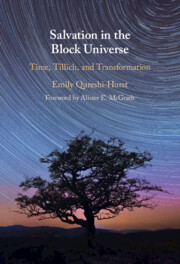
Salvation in the Block Universe
- Time, Tillich, and Transformation
-
- Published online:
- 09 January 2025
- Print publication:
- 23 January 2025
Creation as divine absence: A metaphysical reframing of the problem of evil
-
- Journal:
- Religious Studies , First View
- Published online by Cambridge University Press:
- 06 November 2024, pp. 1-16
-
- Article
-
- You have access
- Open access
- HTML
- Export citation
Is ‘orthodox panentheism’ unorthodox? A response to James Dominic Rooney
-
- Journal:
- Religious Studies / Volume 61 / Issue 2 / June 2025
- Published online by Cambridge University Press:
- 04 November 2024, pp. 440-447
- Print publication:
- June 2025
-
- Article
- Export citation
3 - The Philosophy of Religion and Its Limitations
-
- Book:
- Exploring Religious Pluralism
- Published online:
- 14 March 2024
- Print publication:
- 21 March 2024, pp 36-48
-
- Chapter
- Export citation
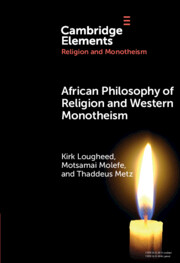
African Philosophy of Religion and Western Monotheism
-
- Published online:
- 26 February 2024
- Print publication:
- 28 March 2024
-
- Element
- Export citation
A cross-cultural perspective on God's personhood
-
- Journal:
- Religious Studies / Volume 61 / Issue 1 / March 2025
- Published online by Cambridge University Press:
- 13 December 2023, pp. 37-54
- Print publication:
- March 2025
-
- Article
- Export citation
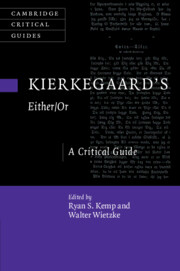
Kierkegaard's Either/Or
- A Critical Guide
-
- Published online:
- 16 November 2023
- Print publication:
- 30 November 2023
When to give weight to weighty religious disagreement
-
- Journal:
- Religious Studies / Volume 60 / Issue 3 / September 2024
- Published online by Cambridge University Press:
- 02 August 2023, pp. 364-376
- Print publication:
- September 2024
-
- Article
- Export citation
Introduction
-
- Book:
- German Philosophy and the First World War
- Published online:
- 30 March 2023
- Print publication:
- 20 April 2023, pp 1-11
-
- Chapter
- Export citation
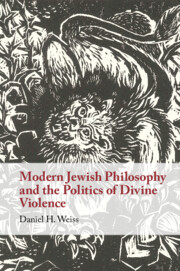
Modern Jewish Philosophy and the Politics of Divine Violence
-
- Published online:
- 30 March 2023
- Print publication:
- 06 April 2023
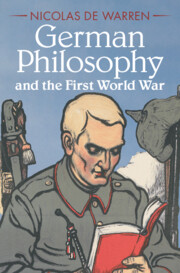
German Philosophy and the First World War
-
- Published online:
- 30 March 2023
- Print publication:
- 20 April 2023
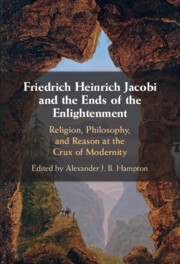
Friedrich Heinrich Jacobi and the Ends of the Enlightenment
- Religion, Philosophy, and Reason at the Crux of Modernity
-
- Published online:
- 09 February 2023
- Print publication:
- 16 February 2023
